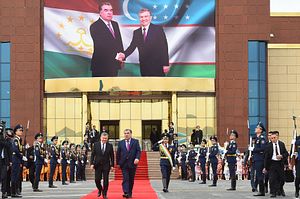Tajikistan has begun supplying Uzbekistan with electricity, Tajik media reported this week. According to RFE/RL’s Tajik Service, locally known as Radio Ozodi, after a nine-year interruption, the energy trade across the Tajik-Uzbek border has resumed. Specifically, Tajikistan has begun supplying Uzbekistan with electricity via a power line running from the Regar substation, near the city of Tursunzoda west of Dushanbe, to the Gulcha substation across the border in Uzbekistan.
The resumption of the energy trade between the two countries is the result of more than a year of concerted diplomacy spearheaded by Uzbek President Shavkat Mirziyoyev.
In February, the head of the Tajik state-run power company Barki Tojik, Mirzo Ismoilzoda, said that Tajikistan would export 1.5 billion kilowatt hours (kWh) of electricity to Uzbekistan from April through September. At the time, Eurasianet reported that the pricing had yet to be worked out.
Asia Plus reported this week that Uzbekistan will pay 2 cents per kWh of electricity, about half the price paid by Afghanistan in 2017, for the summer months. Last year, Tajikistan reportedly supplied Afghanistan with 1.3 billion kWh of electricity.
The sides, it appears, are considering electricity trades in the winter as well. However, in winter, Tajikistan traditionally needs to import electricity.
Barki Tojik officials told Eurasianet in February that an agreement on resurrecting Central Asia’s Soviet-era unified power grid had been reached but the technical details were still being hammered out.
Uzbekistan withdrew from the grid in 2009, effectively shutting it down and preventing Tajikistan from exporting electricity to countries like Turkmenistan and Kazakhstan with which it does not share borders. The reverse was true as well, with Uzbekistan impeding the import of electricity via its territory. With few resources, Tajikistan has sought to capitalize on its geography to generate hydropower for both domestic consumption and export. The resurrection of the unified energy grid will be a boon to Dushanbe.
Last month, Mirziyoyev traveled to Dushanbe to meet with his Tajik counterpart, Emomali Rahmon. It was the first state visit by an Uzbek president since 2000. With big smiles, the two leaders appeared to put past disagreements behind them. Mirziyoyev, as Reuters reported, seemed to drop Uzbekistan’s longstanding opposition to Tajikistan’s Rogun dam project. Rahmon told reporters after meeting with the Uzbek president, “We share the view that the existing hydropower facilities and those under construction will help resolve the region’s water and power issues… In this regard, we welcome Uzbekistan’s support for the development of hydropower facilities in Tajikistan, including Rogun.”
The energy trade, as noted above, goes both ways. In March, UzDaily reported that Uzbekistan would supply Tajikistan with about 126 million cubic meters of natural gas at a price of $120 per 1,000 cubic meters — netting Tashkent an expected $15.1 million. The agreement was reportedly signed during Mirziyoyev’s visit. As Eurasianet reported in November 2017 — when talk of Uzbekistan resuming gas exports to Tajikistan gained steam — Tashkent stopped selling gas to Dushanbe in 2012, after years of ratcheting up the price. “By 2008, the rate was set at $145 per 1,000 cubic meters of gas, and then up to $300 for that amount the following year.”
The pieces certainly seem to be falling into place for the resurrection of the unified power grid. The next steps, it would seem, lie in Uzbekistan’s allowance of its territory and infrastructure to be used by its neighbors to swap electricity among themselves.
































